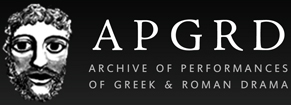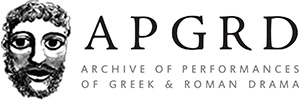The first two-year public engagement training programme for graduate students entitled ‘Communicating Ancient Greece and Rome’ (CAGR), run by the APGRD, was awarded funds by the AHRC in 2010.
20 doctoral students were selected from CRSN (Classical Reception Studies Network) institutions nationwide through competitive application to participate in the programme. The students travelled to venues around the country to learn about and to practise public engagement techniques that enabled them to communicate their research to the general public in innovative, exciting and accessible ways.
Sessions covered print, broadcast and digital media, as well as the fostering of partnerships with industries and institutions through public programmes. The participants had the opportunity to explore their ideas further through workshops and continued contact with a team of experts. Over the course of the two-year programme, participants devised and undertook their own public engagement programme with the help of our experts. In the final session, participants presented their projects, their processes and results.
The schedule of sessions:
Introduction to print media
Creative non-fiction - 13 December 2010, National Theatre archive, London
Daniel Rosenthal (writer, critic and journalist) and Gavin Clarke (National Theatre Archivist) explored the principles and processes of using primary research materials in writing accessible scholarly literature for a general audience.
Popular journalism - 10 January 2011, National Theatre archive, London
Daniel Rosenthal (writer, critic and journalist) explored the principles of research and writing concise, accessible articles for newspapers and popular journals, including interview techniques and understanding your audience.
Introduction of broadcast media
TV and radio: pitching, presenting and producing - 21 March 2011, Oxford
Beaty Rubens (BBC radio producer), Bettany Hughes (historian, author, broadcaster), and Alison Kahn (Director, Oxford Academy of Documentary Film) explored the principles of creating a TV/radio programme for a public audience, including the role of the academic consultant and the process of being interviewed.
Audio recording, oral history and digital preservation - 28 April 2011, Nottingham
Cynthia Brown (Oral History Society accredited practitioner and trainer) explored the practicalities of independently recording and safeguarding your interviews, lectures, programmes or oral histories in order to make them widely available, including copyright issues, digital editing and an introduction to oral history projects in the community.
Introduction to digital media
Web 2.0: websites, podcasts, blogs, You Tube, Twitter - 27 June, Oxford
Tom Wrobel (Website and database developer) and Elton Barker (lecturer in Classical Studies, Open University) explored the practical and creative considerations involved in using a website and social-web applications to disseminate information and engage the public effectively with new research.
How to make your research live - 12 December 2011, Liverpool
Tom Wrobel (Website and database developer) offered an introduction to copyright, Open Access, and Creative Commons licensing; followed by a practical session by Sara Morgan (Wetherall Institute of Molecular Medicine, Oxford University) on creating effective research posters.
Fostering Partnerships through Public Programmes
Working with museums, archives and the heritage sector - 11 January 2012, Kedleston Hall, Derby
Simon McCormack (House & Collections Manager, Kedleston Hall, Derby) and Daniele Westerhof (freelance rare books cataloguer and historian) explored the role of the academic in archival and curatorial work, including curating a public exhibition and developing a public programme based around source material.
Working with schools - 19 March 2012, Oxford
Bob Lister (Faculty of Education, Cambridge University) explored the practical and creative considerations of working with schools and communicating effectively with young people.
Working with the creative industry/practitioners - 27 April 2012, RSC, Stratford-upon-Avon
Struan Leslie (RSC Head of Movement), Michael Boyd (RSC Artistic Director), Jacqui O’Hanlon (RSC Director of Education), Lyn Darnley (RSC Head of Artists’ Development), Pippa Hill (RSC Literary Manager) and Michelle Morton (RSC Programmes Editor) explored the role of the academic in producing creative work to engage the public with research on stage.


